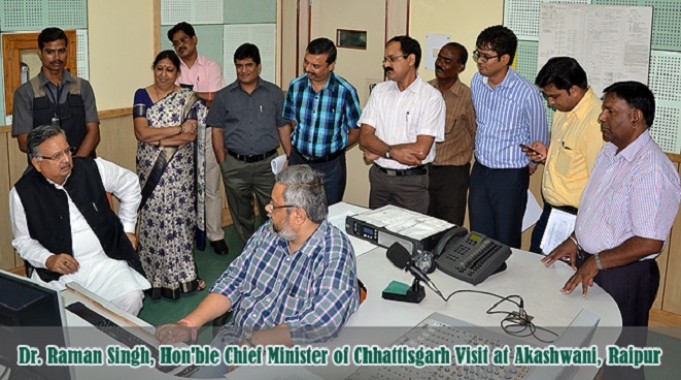Should AIR do propaganda or Jan ki Baat?
Chhattisgarh CM Raman Singh with AIR officials in Raipur.
Recently a superintendent of police in a Maoist-affected district casually told me, sitting in his office, “This local All India Radio station should be burnt down. You can’t hear it a few hundred metres away, forget about in remote areas where the need is most.”
I was glad to hear later that All India Radio (AIR) has decided to replace its old valve-based technology, which made those radio stations almost useless, with solid state transmitters in six AIR stations in Maoist-affected areas at an investment of Rs 32 crore.
The Information & Broadcasting Ministry has also decided to spend another Rs 300 crore to improve AIR’s presence in the 35 worst-affected districts. The Ministry plans to start five new radio stations in Sukma, Narayanpur, Jagdalpur, Dantewada and Gaya districts. Patna and Ranchi stations will be given more powerful transmitters and will broadcast in 30 tribal languages such as Bhojpuri, Maithili, Dhurvi, Dorli, Chhattisgarhi, Sindhi, Santhali, Desia , Mundari, Kurukh, Khariya , Ho and Bangla, besides other dialects and languages, according to a note from the Ministry.
The note adds: “The Centre has decided to counter left wing propaganda in Maoist and Naxalite-affected areas with a radio broadcast programmes riding on "sanskar geet," traditional folk songs centred around community welfare and peace in local languages and discourses by religious and spiritual personalities and content showing the ill effects of violence in the most affected districts”.
The note explains that this is part of the new content policy that it has come up with to help AIR reach out to people in the 35 districts most affected by left wing extremism. At present, people in these areas have no access to TV or newspapers and enjoy only limited radio access.
The new content, to be relayed by six new high power transmitters, will focus on disseminating information about government schemes to eliminate poverty, showing true stories of how violence has wrecked lives, interviews with law and order officials, and culture, sports, and arts programmes. Till now AIR in these areas had content only in Hindi or Telugu and much of it comprised film songs.
"Most importantly” an I&B officer added “there are traditional songs and shanti geet in these areas that we want to record as part of our archives and broadcast at regular intervals. The point of these 15 minute programmes is to make the people there realise how futile violence is and make them turn to education and peace".
Interactive programmes based on telephone calls to increase the participation of state functionaries are being planned, along with news bulletins.
Finally, New Delhi seems to have realized that the days of preachy one-way communication are almost over. What little communication currently takes place is ruined by frequent breaks. So establishing new radio stations and broadcasting in 30 tribal languages is a very welcome move, as long as the result is dialogue rather than the government talking to itself.
Mobile phones have reached very remote areas even in these Maoist-affected regions, mainly because Maoists have come under pressure from local people to let them use phones. If radio can be linked with mobile phones and the internet, it has the potential to convert radio from a one-way top down model to a two-way democratic communication platform which can change things in these areas.
Radio may be a thing of past for many in developed areas but as the Information & Broadcasting Ministry’s current policy paper rightly says, it is the most important communication tool for reaching these areas. But this tool must allow people to express their anger and unhappiness in addition to allowing the government to talk about its policies.
Sri Sri Ravi Shankar once had suggested that farmers should be taught meditation to stop farmer suicide. His disciples have been spreading this nostrum in Salwa Judum camps for some time now. AIR’s proposed policy of broadcasting shanti geet to the denizens of Chhattisgarh who live under the shadow of Naxalism and state repression, looks like an extension of Shankar’s idea.
Britain has a law that 25 per cent of all radio and television programmes must be produced by outside producers as a way of bringing a diversity of voices to the newsroom. Jagdalpur and Raipur radio stations already broadcast in Gondi and Chhattisgarhi. Though these broadcasts can be improved and increased, it will be advisable to make them more interactive by bringing more voices in from the ground and this can be done with the help of mobile phones.
An officer in Chhattisgarh told me some time ago that we have only one choice: “Gali ya Goli” (abuse or bullets). If AIR can provide a platform for the adivasis of central India to express their bile over 69 years of bad governance and if we can listen to this abuse carefully and act on their grievances honestly, then we can also solve the problem of bullets. AIR has the opportunity to play a historic role but if it behaves like another government department, it will do more harm than good.
Prime Minister Narendra Modi has understood the importance of radio and is using it for his Man Ki Baat ((My thoughts) very effectively. But the need of the hour is to listen to Jan Ki Baat (What people think).
Shubranshu Choudhury is the founder of CGNet Swara which uses mobile phones to bridge the communication gap between the local bureaucracy and tribal people in Chhattisgarh.







